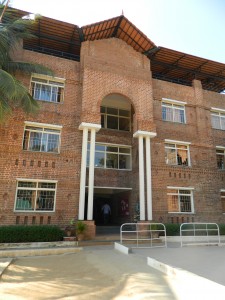Primary School ( Grades 1-4)Primary School ( Grades 1-4)
The primary school (Grades I to 4) follows a customized syllabus based on American psychologist Howard Gardener’s theory of Multiple Intelligences. The interdisciplinary approach acknowledges the existence of multiple types of intelligences and its diverse expression in each student; and the curriculum is designed to address all the versatile forms intelligence takes. Spatial, linguistic, logical-mathematical, kinesthetic, musical, interpersonal, intrapersonal and naturalist elements are incorporated into a well-rounded curriculum, such that every student can excel at whatever he or she does best, while improving any under-developed areas.
- Academics
- Classroom
- Assessment
Academics
The curriculum at Primary school is not just textbook and knowledge but is holistic learning which focuses on value systems to sensitise young minds to the environment around them. Interdisciplinary activities (Art and craft/ Music tied up with SST or English lessons) are commonly used. The key areas that the primary school curriculum addresses are
- Honing of listening, speaking, reading and writing skills in English and 2nd language (Hindi/Kannada/Urdu). Compulsory Library sessions, Spelling and handwriting classes every week.
- Compulsory spoken Kannada( Kadaya Kannada commences in Grade 1 and continues until Grade 10.
- Building a strong foundation in mathematics, ( Math, Mindspark, Mental Math)
- An introduction to the subjects of science and social studies (EVS) inquiry sessions, story sessions ( Multi disciplinary language- SST). EVS splits into Science and SST in Grade 4.
- Nurturing an interest in General Knowledge,
- Art & Craft, Yoga, Music( Indian & Western), Theatre and Dance( Indian and Western)
- An emphasis on physical education and sport
- Basic of Computer Tech- Focus on Microsoft Office, Linnux
- Guest lectures, Field trips and Nature walks add to experiential education.
- Essential Life Skills like folding clothes, serving water, cooking without fire, sewing etc.
Classroom
Every day begins with circle time: Here the teacher discusses with the children Life skills and values which need to be reinforced time and again to ensure good behaviour and attitude in children.
Assessments
At The Deens Academy, we follow a system of continuous multi-disciplinary assessment, which could be formal or informal. We also follow a differentiated system of assessment to cater to the varied needs of children.
The child seeking entry into Deens is evaluated on his/her skills and abilities in order to determine the level in comparison to the expectation of the class into which admission is sought. This helps the teacher to modulate the classroom transaction in order to meet the child’s needs.
With the firm belief that education touches the mind as well as the being and each influences the other, information regarding each student is collected, taking into account their ability to apply knowledge, their learning process and how they conduct themselves in different situations. These findings form the basis of a continuous feedback process to the student and parents. A systematic follow up programme is built around these evaluations, be it on the academic, co-scholastic or value/attitudinal front.
We recognise that the larger objective of the academic programme is to open minds and steer a child towards critical thinking and application. To this end, we administer assessments that are generated by our staff, keeping in mind the acceptable academic levels globally. Children experiment through and find their feet, thus honing critical life skills and sharpening their academic prowess. The curriculum is therefore designed to ensure that children are in a state of perpetual academic readiness.
Tasks could be varied within a class, homework, class work, projects, presentations- each lends to assessment, projecting a different aspect of the child’s learning.
Much of the assessment conducted is diagnostic, but we also take recourse to summative assessments at the end of each learning period
The school year is divided into 2 terms for Grade 1 – Grade 5 follow a continuous assessment pattern using the above methods with a summative assessment at the end of every term. The marks are published on the student ERP page. The students of grade 1-10 are evaluated by a 9 point grading system. Each grade, given on the basis of both formative and summative assessments will correspond to the range of marks indicated below:
| grade | A1 | A2 | B1 | B2 | C1 | C2 | D | E1 | E2 |
| marks | 91-100 | 81-91 | 71-80 | 61-70 | 51-60 | 41-50 | 33-40 | 22-32 | 0-21 |
Olympiad – The SOFworld provides competitive platform of IMO (International Math Olympiad), NSO (National Science Olympiad), NCO (National Cyber Olympiad) within the school premises which aims at enabling students to put his / her skills, memory, talent and knowledge to test.
Asset – ASSET Stands for Assessment of Scholastic Skills through Educational Testing. It is a scientifically designed, skill-based assessment test. Rather than testing rote learning, through multiple-choice questioning, it focuses on measuring how well SKILLS and CONCEPTS underlying the school syllabus have been learnt by the student. The test provides information on the strengths and weaknesses of individual students and also entire classes.
 Deens Academy Route to Excellence
Deens Academy Route to Excellence

